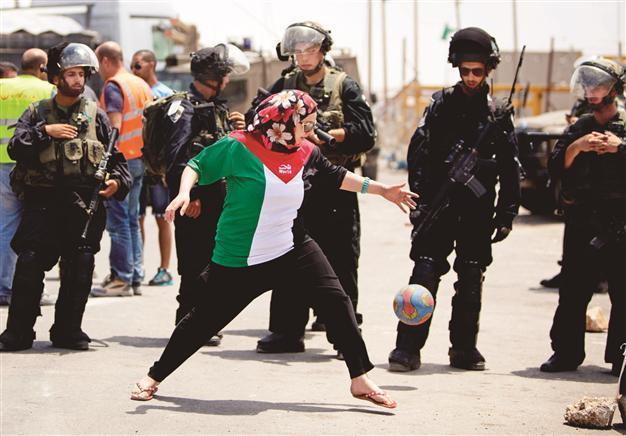Israel evades FIFA sanctions – for now
James M. Dorsey

The campaign by the Palestine Football Association (PFA) is part of broader move by the newly formed unity government to gain recognition of Palestinian statehood through membership in international organizations and isolate Israel.
A compromise formula this week saved Israel from being sanctioned by world football governing body FIFA and has bought the Jewish state time, but serves as a harbinger of growing diplomatic and public impatience with perceived Israeli intransigence in efforts to resolve the Israeli-Palestinian conflict.
In rejecting, at least for now, Palestinian efforts to suspend membership of the Israel Football Association (IFA) if not expel it from FIFA on the grounds of alleged persistent Israeli measures to undermine Palestinian football activity and development, FIFA for now averted becoming the first international organization to sanction the Jewish state.
The campaign by the Palestine Football Association (PFA) is part of broader move by the newly formed unity government that is supported by rival factions, West Bank-based Fatah headed by the Palestine Authority president Mahmoud Abbas and Hamas (the Islamist militia that controls the Gaza Strip), to gain recognition of Palestinian statehood through membership in international organizations and isolate Israel. It follows the breakdown in April of U.S.-sponsored Israeli-Palestinian peace talks.
The compromise presupposes an Israeli willingness to cooperate at a time that it is on the defensive because of a U.S. and European willingness to deal with the new Palestinian government despite the fact that the United States and Israel have blacklisted Hamas as a terrorist organization and Israeli concerns about efforts to resolve the Iranian nuclear crisis and growing calls for a boycott of Israel that could be boosted by a possible European Union boycott of Israeli products that originate from occupied territory.
The compromise hammered out by FIFA at a meeting between the PFA and the IFA in Sao Paolo on the eve of the World Cup in Brazil amounts to an admission that a FIFA task force established last year had failed to resolve Palestinian grievances. It involves the establishment of a new committee that would oversee efforts to achieve a solution and would report back to FIFA at the end of this year.
FIFA president Sepp Blatter said in order to succeed, the new committee “needs the full support of the Israeli government.”
That may prove easier said than done. The compromise was reached after Mr. Blatter last month – during a visit to the Middle East – failed to get an agreement by the PFA and the IFA that he had hoped would be signed during this week’s FIFA congress in Sao Paolo.
FIFA’s task force was initially created because an earlier arrangement failed. The arrangement negotiated by the football body involving a hot line between the IFA and the PFA to ease inhibiting restrictions on Palestinian players, which according to PFA president Jibril Rajoub, demonstrated that the IFA had no sway over Israeli security forces.
Resolving issues is frequently complicated by a tendency of Mr. Rajoub and his Israeli counterpart, Avi Luzon, to politicize issues. As a result, FIFA officials at times have to work through backchannels to get things done. All though a longshot, Mr. Rajoub, a former security official, moreover, is believed to want to run for the Palestinian presidency in elections expected in about six months.
The Palestinian effort to get Israel sanctioned by FIFA comes as Mr. Abbas is buoyed by the fact that his agreement with Hamas has met less international resistance than either Israel or Palestine had hoped for or expected.
Israel, which has vowed not to negotiate with Hamas as long as it refuses to recognize the Jewish state and renounce its armed struggle, had hoped that the U.S. and the EU would back its refusal to deal with a Palestinian government that includes Hamas, an offshoot of the Muslim Brotherhood. General Amos Gilad, the Israeli Defense Ministry’s director of policy and political-military relations, recently charged that the unity government was intended “to undermine our legitimacy around the world.”
As a result, Israel has signaled that it is in no mood to accommodate the new Palestinian government with its announcement of plans to construct new housing in the occupied territories in response to the formation of the unity government and its willingness to risk straining relations with the United States, its closest ally, over Iran and U.S. willingness to work with the Palestinian government. It is unlikely that it would make an exception for the PFA.
The split between Fatah and Hamas was one reason why Israeli-Palestinian peace talks were stillborn. Privately, many Western officials argue that no viable agreement could be achieved as long as the Palestinian polity was divided. That is not to say that a burying of the hatchet between Fatah and Hamas has opened a door. Hamas is willing to let talks proceed, but continues to refuse to formally recognize Israel.
The EU has said it would continue to fund the Palestinian government provided it maintained its recognition of Israel and its agreements with Israel and continues to disavow violence. Fatah and Hamas have agreed that their government populated by technocrats would honor past Palestinian agreements with Israel.
The EU put its plans to boycott Israeli products from occupied territories on hold to give the U.S.-mediated peace talks a chance. A declaration of the boycott would boost the Boycott, Disinvestment and Sanctions (BDS) movement, which has gained currency in academic and artistic circles as well as among some prominent European football players. The movement lobbies for a boycott of Israel in a bid to force it to withdraw from territory it occupied during the 1967 Middle East War.
